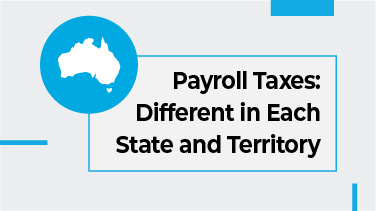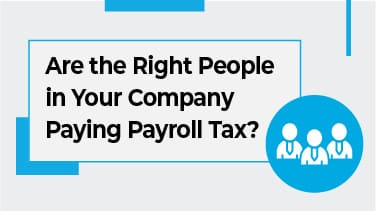Are you a new business owner in Australia feeling overwhelmed by setting up payroll taxes? If so, you’re not alone.
The idea of navigating the rules and regulations of payroll taxes can be daunting! But the good news is that setting up payroll taxes doesn’t have to be a big deal.
Payroll taxes are government taxes on Australian wages and employee salaries. Who pays payroll taxes?
The responsibility for paying payroll taxes falls on you as an employer. These taxes fund various government programs and services such as healthcare and education.
The rate of tax owed and collected by the Australian Taxation Office (ATO) depends on the salary or wages paid to employees.
But did you know there is a difference in payroll taxes from state to state?

Payroll Taxes—Different in Each State and Territory
The Australian state governments set payroll taxes, which vary depending on the state or territory in which a business is located.
The state governments use tax thresholds to determine whether a business must pay payroll taxes.
These thresholds are based on the taxable wages and salaries a business pays its employees. If a business’s taxable wages and salaries fall below the threshold set by the state government, the business is not required to pay payroll taxes.
However, if a business’s taxable wages and salaries exceed the threshold, the business is obligated to pay the tax.
The threshold for each state or territory is different and can change from year to year.
As a business owner, you must be aware of the rules and regulations in your state or territory.
You must also check the tax threshold regularly to ensure that you comply with government requirements.
You can use the government’s payroll tax calculator to determine your payroll obligations, or you can consult our team of experts at GeekBooks for professional advice.
Now let’s look at the thresholds for each Australian state and territory.
Australian Capital Territory
The Australian Capital Territory (ACT) threshold is currently $2,000,000 annually or $166,666.66 monthly.
If a business’s taxable wages and salaries exceed these amounts, the business is obligated to pay payroll taxes of 6.85%. The legislation that sets the rate is the Payroll Tax Act 1971 (ACT).
New South Wales
The NSW threshold is currently $1,200,000 annually.
If a business’s taxable wages and salaries exceed this amount, the business is obligated to pay payroll taxes of 5.45%. The Payroll Tax Act 2007 (NSW) is the legislation that sets the rate.
Northern Territory
In Northern Territory (NT), the threshold is currently $1,500,000 annually, $125,000 monthly, or $28,846 weekly.
However, if a business’s taxable wages and salaries exceed these amounts, the business is obligated to pay payroll taxes of 5.5%. The legislation that sets the rate is the Payroll Tax Act (NT).
Queensland
The QLD threshold is currently $1,300,000 annually or $108,333 monthly.
If a business’s taxable wages and salaries exceed this amount, the business is obligated to pay payroll taxes of 4.75% for up to $6,5000,000, and 4.95% for over $6,500,000.
From June 30, 2023, regional employers may be entitled to a 1% discount on the tax rates. The Payroll Tax Act 1971 (QLD) is the legislation that sets the rate.
South Australia
In South Australia (SA), the threshold is currently $1,500,000 annually, $125,000 monthly, or $28,846 weekly.
If a business’s taxable wages and salaries exceed these amounts, the business is obligated to pay payroll taxes of 0% to 4.95% for amounts between $1,500,000 – $1,700,000 and 4.95% for $1,700,000 or more. The Payroll Tax Act 2009 (SA) is the legislation that sets the rate.
Tasmania
In Tasmania (TAS), the threshold is currently $1,250,000 annually or $24,038 weekly.
If a business’s taxable wages and salaries exceed these amounts, the business is obligated to pay payroll taxes of 4% for amounts between $1,250,001 – $2,000,000 and 6.1% for $2,000,001 or more. The Payroll Tax Act 2008 (TAS) is the legislation that sets the rate.
Victoria
The threshold in Victoria (VIC) is currently $700,000 annually or $58,333 monthly.
If a business’s taxable wages and salaries exceed this amount, the business is obligated to pay payroll taxes of 4.85% or 1.2125% for regional employers. The Payroll Tax Act 2007 (VIC) is the legislation that sets the rate.
Western Australia
In Western Australia (WA), the threshold is currently $1,000,000 annually or $83,333 monthly.
If a business’s taxable wages and salaries exceed this amount, the business is obligated to pay payroll taxes of between 5.5% – 6.5%. The Payroll Tax Assessment Act 2002 (WA) is the legislation that sets the rate.

Are the Right People in Your Company Paying Payroll Tax?
It’s clearly important to understand the payroll tax thresholds and rates for each Australian state and territory.
Ensuring the right people in your business are paying the payroll taxes is also vital.
Depending on your business structure, you may have a payroll tax liability even if you don’t meet the threshold.
Certain directors, partners, and contractors may also be liable for payroll tax, depending on the state where you conduct business.
Because of this, it’s important to review your payroll tax obligations carefully and consult with a professional to ensure you comply with all relevant laws.
At Geekbooks, we’re the go-to experts for all things related to payroll taxes in Australia.
For the guidance you need for a stress-free payroll tax experience, contact us at 02 9158 3591, or complete our online booking form.



